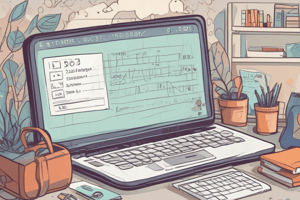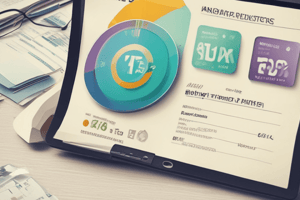Podcast
Questions and Answers
What is a credit score?
What is a credit score?
- The maximum amount of credit you can use
- A numerical rating of credit-worthiness (correct)
- A report on past borrowing
- A measure of how much money you have
What is the credit limit?
What is the credit limit?
The amount of money you can charge to a credit card.
What does a credit report include?
What does a credit report include?
A record of a person's credit history and identifying information.
The Fair Credit Reporting Act allows consumers to view their credit report.
The Fair Credit Reporting Act allows consumers to view their credit report.
What is the Federal Fund Interest Rate?
What is the Federal Fund Interest Rate?
A hard credit inquiry has no effect on your credit score.
A hard credit inquiry has no effect on your credit score.
A soft credit inquiry affects your credit score.
A soft credit inquiry affects your credit score.
What is the role of credit bureaus?
What is the role of credit bureaus?
What does a credit history record?
What does a credit history record?
What is a default in credit terms?
What is a default in credit terms?
What is an Initial Fraud Alert?
What is an Initial Fraud Alert?
Flashcards
Credit Score
Credit Score
A number rating your creditworthiness, showing how likely you are to pay back debts.
Credit Limit
Credit Limit
The highest amount you can charge on a credit card.
Credit Report
Credit Report
A detailed record of your borrowing and repayment history.
Fair Credit Reporting Act
Fair Credit Reporting Act
Signup and view all the flashcards
Hard Credit Inquiry
Hard Credit Inquiry
Signup and view all the flashcards
Soft Credit Inquiry
Soft Credit Inquiry
Signup and view all the flashcards
Credit Bureaus
Credit Bureaus
Signup and view all the flashcards
Credit History
Credit History
Signup and view all the flashcards
Default
Default
Signup and view all the flashcards
Initial Fraud Alert
Initial Fraud Alert
Signup and view all the flashcards
Federal Fund Interest Rate
Federal Fund Interest Rate
Signup and view all the flashcards
Study Notes
Credit Score
- A numerical rating reflecting an individual's credit-worthiness, indicating the likelihood of repaying debts.
- The FICO score is the most widely used credit score in the United States.
- Based on information from credit reports generated by three main credit bureaus.
Credit Limit
- The maximum amount of money that can be charged to a credit card.
- Exceeding this limit may result in declined transactions and potential penalties.
Credit Report
- A detailed record of an individual's credit history, including loans and repayment activity.
- Contains identifying information (names, addresses) to match individuals with their credit histories.
Fair Credit Reporting Act
- A federal law ensuring accuracy, completeness, and privacy of information in credit reports.
- Consumers have the right to access their credit reports and dispute inaccuracies.
Federal Fund Interest Rate
- An interest rate established by the Federal Reserve Bank that influences government loan interest rates.
Hard Credit Inquiry
- Occurs when a creditor checks your credit history to make lending decisions.
- Affects your credit score and remains on credit reports for up to two years.
Soft Credit Inquiry
- A background check on credit that does not impact your credit score, often conducted for employment purposes.
Credit Bureaus
- Companies, also known as credit agencies, collect and analyze individual credit information.
- Major credit bureaus in the U.S. include Equifax, Experian, and TransUnion; they are private, for-profit entities regulated by the government.
Credit History
- A comprehensive record of all borrowing and repayment activities, including loans, credit lines, and payment records.
- Differentiates between the actions taken (credit history) and the documented proof (credit report).
Default
- Occurs when a borrower fails or refuses to repay a debt or required payment.
Initial Fraud Alert
- A temporary alert placed on a credit file to help prevent identity theft.
- Lasts for 90 days and can be renewed if necessary.
Studying That Suits You
Use AI to generate personalized quizzes and flashcards to suit your learning preferences.




